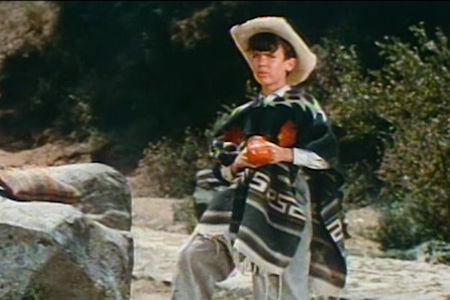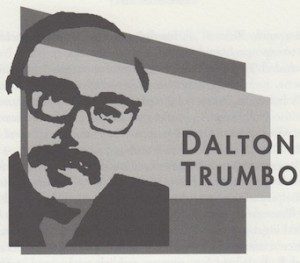Born: December 9, 1905, Montrose, CO
Died: September 10, 1976, Los Angeles, CA
Trumbo took a great big invisible bow.
—Orson Welles
When McCarthyism ruled the 1950s, the House Un-American Activities Committee (HUAC) feared that communism was threatening the United States. Focusing their attention on Hollywood, the committee launched an aggressive campaign against the studios—against screenwriters in particular, the men and women who penned the words that HUAC suspected were chipping away at the patriotism of moviegoers. Of all individuals in the film industry forced to testify during the red scare, 60 percent were screenwriters. And the highest-paid screenwriter at the time was Dalton Trumbo.
The Film 100
1. W.K. Laurie Dickson
2 Edwin S. Porter
3. Charlie Chaplin
4. Mary Pickford
5. Orson Welles
6. Alfred Hitchcock
7. Walt Disney
8. D.W. Griffith
9. Will Hays
10 Thomas Edison
11. John Wayne
12. J.R. Bray
13. Billy Bitzer
14. Jesse Lasky
15. George Eastman
16. Sergei Eisenstein
17. André Bazin
18. Irving Thalberg
19. Thomas Ince
20. Marlon Brando
21. Louis B. Mayer
22. Greta Garbo
23. Robert Flaherty
24. Lon Chaney
25. Anita Loos
26. George Méliès
27. Adolph Zukor
28. John Gilbert
29. Max Fleischer
30. John Ford
31. William Fox
32. George Lucas
33. Linwood Gale Dunn
34. Eadweard Muybridge
35. Katharine Hepburn
36. Winsor McCay
37. Stanley Kubrick
38. Buster Keaton
39. James Agee
40. Fritz Lang
41. Marcus Loew
42. Cedric Gibbons
43. James Cagney
44. Ben Hecht
45. Ingmar Bergman
46. Humphrey Bogart
47. Leon Schlesinger
48. Louella Parsons
49. Roger Corman
50. Edith Head
51. Bernard Herrmann
52. Gary Cooper
53. Mike Todd
54. Ernst Lubitsch
55. Sidney Poitier
56. Saul Bass
57. Billy Wilder
58. Bette Davis
59. Erich von Stroheim
60. Max Factor
61. Auguste and Louis Lumière
62. Woody Allen
63. Clark Gable
64. David O. Selznick
65. Gregg Toland
66. Lillian Gish
67. William Cameron Menzies
68. Lucille Ball
69. Samuel Rothafel
70. Akira Kurosawa
71. Marilyn Monroe
72. Vittorio De Sica
73. Natalie Kalmus
74. Gene Siskel and Roger Ebert
75. Willis O’Brien
76. Shirley Temple
77. Yakima Canutt
78. Sam Peckinpah
79. Jackie Coogan
80. Federico Fellini
81. Leni Riefenstahl
82. Steven Spielberg
83. Sam Warner
84. Jean-Luc Godard
85. Robert De Niro
86. Fred Astaire
87. Francis Ford Coppola
88. Ted Turner
89. Clint Eastwood
90. Dalton Trumbo
91. Dennis Hopper
92. Richard Hollingshead
93. Melvin Van Peebles
94. John Chambers
95. Mack Sennett
96. Martin Scorsese
97. Karl Struss
98. Busby Berkeley
99. John Hubley
100. John Cassavetes
Trumbo was a novelist who came to commercial and critical success easily with his scripts for Kitty Foyle (1940) and Thirty Seconds Over Tokyo (1944). His name had come to the attention of McCarthy successor John S. Wood while compiling a list of Hollywood Communists. Wood had extremely thin evidence that leftist messages existed in films, and when asked to produce specific passages of dialogue, he often cited lines that had been scripted by Trumbo.
Trumbo was easy prey for Cold War hysterics; he had actually been a member of the Communist Party and had voiced his left-wing sentiments freely. A high-profile and prolific screenwriter with an excellent track record of profitable films, he had recently signed a contract with MGM for more than $3,000 a week. Most of all, his dialogue was characteristically preachy and tended to espouse liberal ideals.
Wood including Trumbo among a group of nineteen “unfriendlies” in a 1947 subpoena. Eventually, only eleven were called to testify; one of them subsequently bolted the country for Germany. The remaining group became infamous as the Hollywood Ten—Edward Dmytryk, John Howard Lawson, Lester Cole, Albert Maltz, Alvah Bessie, Samuel Ornintz, Herbert Biberman, Adrian Scott, Ring Lardner Jr. and Trumbo.
Fearing the entire picture business itself would be blacklisted, many studio heads rushed to cooperate with HUAC by instituting means of “testing” the political affiliations of their contracted employees. The Hollywood Ten urged their fellow filmmakers to stand firm. They themselves refused to be divided and employed legal representation as a group. Their brave message unified the creative community, and luminaries in other fields, most notably Albert Einstein and E.B. White, lent support publicly and joined in fund-raising efforts. When called before the committee, the Hollywood Ten exercised their Fifth Amendment rights by refusing to act as informers against others or answer any questions about their political beliefs. All ten men were convicted of contempt.
Their appeals went all the way to the Supreme Court, which refused to review their cases, deferring to appellate justice Bennett C. Clark’s assertion that “the motion picture industry plays a critically important role in the molding of public opinion and motion pictures are, or are capable of being, a potent medium of propaganda dissemination which may influence the minds of millions of people.” Denied their appeals, the Ten were sentenced in 1949 to prison terms of one year each. Trumbo wrote about his involvement with HUAC and his incarceration in a book called The Time of the Toad (1950).
Throughout the fifties, the blacklist took full effect in Hollywood, altering the career paths of hundreds of actors, directors, production specialists, and screenwriters. Many of them were falsely accused. Most found ways to continue working in the industry. While still behind bars, Trumbo began the first of more than thirty screenplays he would sell using several “fronts.” He enlisted his friend Ian McLellan Hunter to pose as the writer of Roman Holiday (1953) and secretly collected $40,000 from Paramount for it.
Trumbo also peddled some of his finest scripts during this time under psuedonyms, the most famous being Robert Rich. When Trumbo gave the bogus name as screenwriter on The Brave One (1956), he didn’t anticipate that the film would be awarded an Oscar for Best Screenwriting. “Robert Rich” was called to collect the Academy Award, and no one came forward to accept the honor. Gossip and innuendo quickly spread about the origins of the script. Industry insiders knew Trumbo deserved the statuette, but the entire incident was shielded from the public. The following year, the Academy’s board voted to make any admitted Communists or those unwilling to testify to HUAC ineligible for an Oscar. It was Hollywood’s way of signaling to Congress that it still had the problem under control.
However, in the wake of the Robert Rich award, a series of events hastened the end of that dark decade of political persecution. Blacklisted screenwriter Nedrick Young came forward just before the 1959 Academy Awards ceremony to declare that he was the “Nathan Douglas” who had written the nominated script for The Defiant Ones (1958). In 1960, director Otto Preminger boldly admitted that Trumbo was behind the typewriter on his film Exodus; later that year, actor-producer Kirk Douglas risked repercussions and courageously placed Dalton Trumbo’s real name on the credits of Stanley Kubrick’s Spartacus. The attention drawn to these powerful films and the man behind their inspirational scenes effectively erased the blacklist. Publicly humiliated and sensing the Oscar ceremony would become a farce, the Academy rescinded its previous decision but did nothing to rectify their previous mistakes; Robert Rich is still listed as the winner in the Academy’s official records.
Sparked by a new sense of freedom, Trumbo lent his unique gifts to the scripts of Lonely Are the Brave (1962), The Sandpiper (1965), Hawaii (1966), and Papillon (1973). His directorial debut came in 1971 when he scripted and filmed a version of his own 1939 antiwar novel Johnny Got His Gun. Lung cancer abruptly ended his career as a director; he was confined to his home for the next five years.
In 1975, the Academy corrected the credit for The Brave One and gave the famed screenwriter a special Oscar for his contributions. The award was presented to a bedridden Trumbo, just one year before a heart attack would end his life. Sixteen years after his death, Trumbo was honored with another corrective Academy Award, this time for the Oscar-winning screenplay of Roman Holiday, a film he had written more than forty years earlier.
Dalton Trumbo courageously withstood a long period of political repression to emerge as the most successful and resilient survivor of the Hollywood blacklists, and his triumphant comeback embodied the strength of Hollywood’s liberal heritage.
To read all the republished articles from ‘The Film 100,’ go to Reintroducing the Film 100 here on Keyframe.





